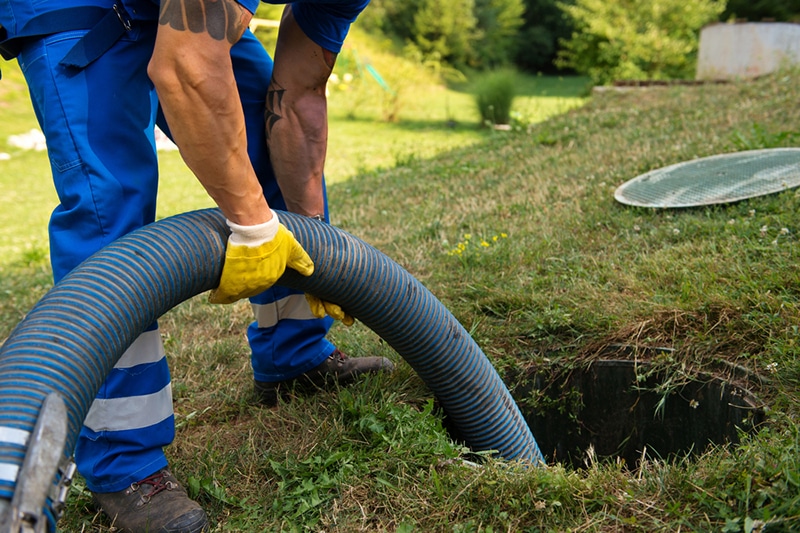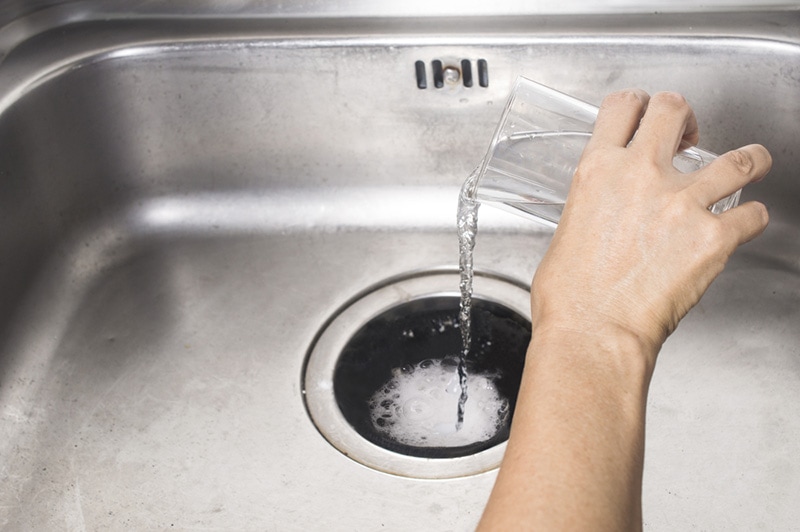Is Drano Septic Safe? (Info & Safer Alternatives)
-
Pete Ortiz
- Last updated:

Drano has been around for many years and has become a popular household name for clearing clogged drains. But is Drano septic safe? While the company says it is, most plumbers argue that it is not. In this article, we will look into the facts and decide for ourselves if Drano is indeed septic safe.
WARNING: Always proceed with caution when using Drano or similar products. Drain and pipe cleaning agents contain extremely toxic and dangerous chemicals. Wear protective eyewear, rubber gloves, and a face mask when handling these products.
Background on Drano
Drano is a caustic drain cleaner that contains sodium hydroxide, aluminum flakes, and several other potent ingredients. It is often used to clear clogged drains or pipes by breaking down and dissolving the blockages.
The company claims that it is septic safe, but many plumbers disagree. They argue that while Drano may break down the clog, it will also damage and weaken septic tanks and other parts of the plumbing system—all things that should be avoided at all costs.
Effects of Drano on Septic Tanks
Septic tanks are used to safely dispose of wastewater from toilets, sinks, and other plumbing fixtures. The tank contains bacteria and other organisms that break down the waste before it is released into the environment.
When Drano is poured into a septic tank, the chemical can kill these organisms and disrupt the tank’s natural balance. This can result in costly repairs or even a complete replacement of the septic system.
Safe Alternatives to Clean Your Drains

The good news is that many alternatives to Drano can clear a clogged drain or pipe without harming your septic system. These include:
- Boiling Water: Boil a pot of water and pour it down the drain. This may be enough to break up the blockage and clear the pipe. Boiling water is known to break down everything from grease to hair.
- Use a Snake: Using a drain snake or an auger can be an effective way to get rid of clogs without the use of harsh chemicals. Drain snakes are available at most hardware stores and are relatively inexpensive. These handy tools can reach deep into the drain and pull out any blockages.
- Baking Soda & Vinegar: This is a common household remedy for clogged drains. Simply pour a cup of baking soda down the drain, followed by half a cup of vinegar. Allow it to sit for about 60 minutes, and then run hot water down the drain.
- Plunger: Plungers are commonly used to unclog toilets, but there isn’t much of a difference when it comes to sinks or bathtubs. Make sure you fill the sink with enough water to cover the plunger head and then plunge away. This can often clear up any blockages that are present.
Tips to Keep Drains Clear
The best way to keep drains clear is to prevent them from getting clogged in the first place. Here are a few tips you can use:
- Don’t Pour Grease Down Your Drains: Grease will congeal and clog up your drains. Instead, you should always pour grease into an old container first, then throw it away in the garbage.
- Install a Drain Filter: Installing a drain filter or strainer can help prevent food particles and other debris from entering your pipes and causing a blockage.
- Dump Coffee Grounds in the Wastebasket: It’s so convenient to toss coffee grounds down the kitchen sink drain, but doing so can cause clogs. So make sure you dispose of them properly by throwing them away instead of down the drain.
After considering all these facts, it is clear that Drano is not septic-safe and should be avoided if you want to maintain your septic system in the long run. While it may be a convenient solution for clearing clogged drains, it is not worth the potential damage it can cause to your plumbing system.
There are much safer ways to clean out a blocked drain or pipe. If you’re having trouble with a clogged drain, make sure to try one of the alternatives mentioned above before reaching for a bottle of Drano.
Conclusion
Bottom line: it’s best to avoid using Drano in septic systems due to its potential to damage plumbing systems and disrupt septic tanks. There are many safer alternatives available that can be used instead, so play it safe and opt for a natural solution.
Featured Photo Credit: KaliAntye, Shutterstock
Contents



